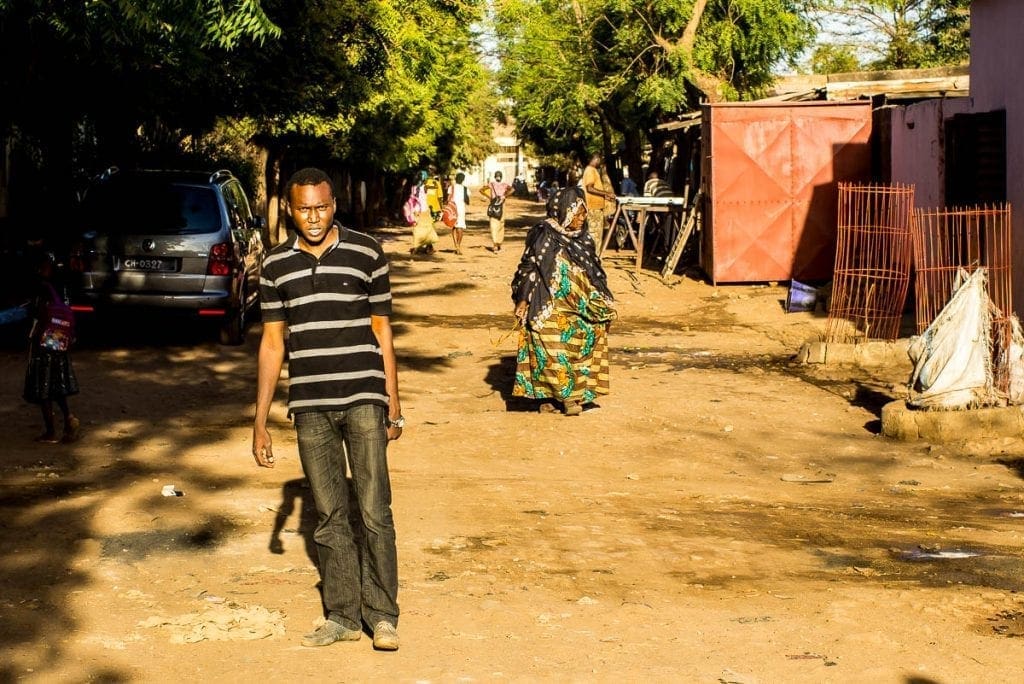Rapper Ami Yerewolo, a paradigm of outspokenness, agrees: “Like everything in a society, mogoya has its strengths and its weaknesses. Its strength is that when you have a problem, the whole family is with you. We sleep together, eat together, talk together. But it also has its hypocritical side. People are vulnerable, there are no jobs, nothing to do, so the only occupation they can find to distract themselves is to hurt each other, to hate each other, to find something with which to destroy the other.”
Ami Yerewolo - Lyamba
Behind the decade of turmoil that Malians have suffered and the coup d’état that ousted Karim Keita’s father, President Ibrahim Boubacar Keita on August 18th, is a deep sense that something essential to the Malian character is being destroyed by greed, corruption and the dazzle of money. “If there are all these problems today,” says Aliou Toure, lead singer of Songhoy Blues, “it’s because mogoya has disappeared and the love of power has eclipsed the power of love. There was a time when we were really happy here in Mali with the little we had, because we were at peace, we were safe and life was beautiful. People are beginning to realize their mistake.”
Songhoy Blues - Worry
Bourama Soumano, hereditary chief of the griots of Bamako, blames this fall from grace on the fact that no one listens to the griots anymore. “The griot’s role in the transmission of mogoya from one generation to another is indispensable,” he says. “Malian society has understood that it was wrong to want to delegate that role to modern communicators such as journalists, TV presenters, people on the internet. The griots haven’t taught the new generation what it should have taught them.”
Another griot, famous on the international music scene, even went so far as to blame religion, by which he meant Islam, for the slow death of mogoya. “Silameya (Islam-ness), that’s what’s destroying everything,” he says. “Religion arrived here only to find that we already had mogoya. It was even more upstanding than their religion. Now they’ve built lots of mosques, but there’s no more mogoya. We were happy before religion. We were doing fine.”
The demise of mogoya, a ‘human-centred’ philosophy, has been at the heart of Mali’s internal moral debate for decades. Now that debate is increasingly couched in Islamic, ‘God-centered’ terms. The immense popularity of charismatic imams such as Mahmoud Dicko, de-facto leader of the opposition M5 movement, suggests that Malians are seeking a sanctified and righteous antidote to the moral bankruptcy of the current political class. But what form should righteousness take? Stronger religious devotion? Or more mogoya? Or both?
Perhaps, in an age of capitalism and consumerism, mogoya is an impossible dream. Perhaps it only ever existed when everyone - kings, nobles, warriors, merchants, griots, craftsmen, slaves - knew their place, and when women stayed at home to educate their children 24/7 (as was asserted by a griot during one of my interviews). Perhaps, as Ivorian writer Amadou Koné suggests, it’s time for a new mogoya, one embodied in a few enlightened individuals like N’Douba, hero of Koné’s novel Les Respects des Morts (1992) who declares: ‘The black man of tomorrow is made not by he who adheres desperately to the past, nor by he that Europe has lead astray by dazzling him, but simply by the one who is sufficiently lucid to advance towards Europe whilst remaining himself.’
Oumou Sangare thinks that Africa can save its mogoya by emulating Japan. “Japan is the most modern country in the world, agreed? Japan is also the most traditional country in the world, agreed? Africa can evolve, whilst preserving certain traditions that are worth preserving. I really want Africa to become like that. And it’s doable.”


